

Tao Te Ching
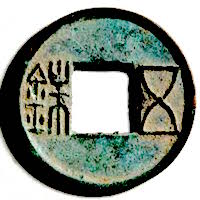
Eastern Han 漢朝 (25 – 220 CE)
The Han Dynasty—Western and Eastern together—is considered a Chinese golden age and today Chinese script is call Han characters and most Chinese people consider themselves Han Chinese. The governmental system synthesized Confucianism, Legalism, and Daoism, the economy prospered, the central government became stronger, and their coinage became the standard for hundreds of years. It was a creative time for science and technology. Inventions during this time include paper making, ship rudders, negative numbers, blast furnaces, crop rotation, and raised relief maps. Over time though, a series of weak emperors let corruption set in, government positions were auctioned off to the highest bidder, and China became too weak to defend against the invading Tatars.
Sages (21)
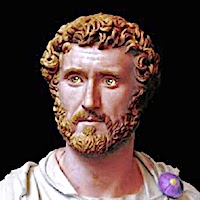
Antoninus Pius (Antonines)
86 – 161 CE
One of history's most enlightened, major political leaders
One of the best political leaders of all time, Antoninus began his reign by giving the country an immense amount of his personal fortune. Religious but free of superstition, he encouraged the tolerance of Jews, Christians, freed slaves, and other non-Roman religions. He brought Rome to its apex of prosperity and peace giving the Empire its most equitable period of all time. He liberalized the law, initiated the rights of defendants in trials still used today, told judges to treat defendants as innocent until proven guilty, enforced more equality between men and women, and never made decisions without working on consensus with the Senate. With virtually no enemies and hundreds of friends, he was immune to flattery and was so modest that it was impossible to tell he was emperor by just observing his behavior.
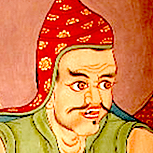
Āryadeva འཕགས་པ་ལྷ། (Kannadeva)
3rd C. CE
Born a king, Aryadeva became teacher to 1000 monks, a Mahasiddha, abbot of Nalanda University, disciple/teacher of Nagarjuna, 15th patriarch of Chan Buddhism, medicine doctor monk, and cofounder of the Mahayana school. One of “the six great commentators on the Buddha's teachings,” he wrote many important texts, exemplified in his path the progressive loss of a belief in a separate self, and remains a shining example of direct and complete realization.
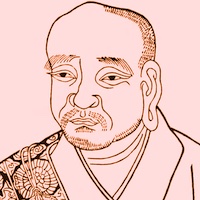
Ashvaghosha སློབ་དཔོན་དཔའ་བོ། (Aśvaghoṣa)
80 – 150 CE
"Bodhisattva with a Horse-Voice" (because even horses listened to his talks)
Considered the first Sanskrit dramatist, one of the greatest Indian poets, and writer of epics that rivaled the Ramayana; Ashvaghosha—because of losing a debate and having to become a Buddhist—transformed from a wandering ascetic into one of his age's most influential philosophers. His writings ranged from religious poems considered a virtue to just read... to political themes critical of caste and Vedic-imposed inequity. He became spiritual advisor to the emperor, Kanishka who helped develop the Silk Route and spread Buddhism into China.
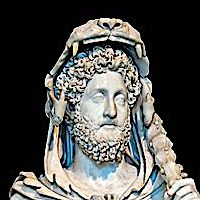
Commodus
161 – 192 CE
How ironic that we still consider Marcus Aurelius such a profound teacher, such an inspirational example of a philosopher/king almost 2000 years after his life while his son gives such terrible evidence of his being such a failure as an educator and father. While Marcus symbolizes the height of Roman culture, Commodus marks a steep decline, the beginning of the end. He constantly drank, gambled, wasted public funds, and maintained a harem that included 300 girls as well as 300 boys. Described as "more bestial than any beast," he abandoned any vestige of ethics or integrity. Cruelty dominated his approach as he watched the society around him fall apart.
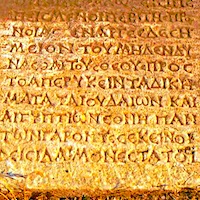
Diogenes of Oenoanda Διογένης ὁ Οἰνοανδεύς
77 – 142 CE
Great Preserver of Epicureanism
Not much is known about Diogenes' life other than that he had a summary of Epicurus' philosophy carved onto a 2.37 x 80 meter wall. Originally taking up 260 square meters of wall space and including c. 25,000 words, now only about a third of it remains. That was enough though however to preserve a good sense of Epicurus' teaching on ethics, physics, and other fields. A close disciple, Diogenes felt that these teachings helped him immensely and he wanted to assure their survival and the ease for as many as possible to read them.

Epictetus Ἐπίκτητος
55 – 135 CE
Born a slave, Epictetus found freedom and—until he was banished in 93 CE—taught philosophy in Rome as a way of life. He taught that the foundation of all philosophy is self-knowledge, that we all have basic goodness, and that we are not separate but interconnected and one with each other and all of the world. His influence extends from Marcus Aurelius to medal-of-honor winning US vice-presidential candidate James Stockdale and includes artists like James Joyce, Tom Wolfe, David Mamet and J.D. Salinger.
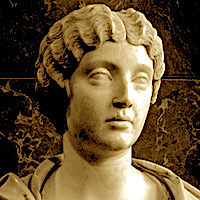
Faustina (Annia Galeria, Faustina the Younger)
130 – 176 CE
Mater Castrorum
Although married to Marcus Aurelius for 30 years, bearing 13 of children, and called by him “so obedient and affectionate a wife;” Faustina was still subject to vicious gossip, called “as faithless as she was beautiful,” and the Augustan History described adulteries with gladiators, sailors, and aristocrats. Their son, Commodus who became the next emperor was know as “a gladiator’s gift to Faustian.” The daughter of Emperor Antoninus Pius and cousin to Emperor Hadrian; Aurelius called her “Mother of the Camp” and she accompanied him on his military campaigns. The soldiers loved her and her devoted husband gave her divine honors after she died including building in her memory one of the Forum’s most beautiful temples, placing her statue in Rome’s Temple of Venus, and establishing in her name a fund for the education and support of orphaned girls.
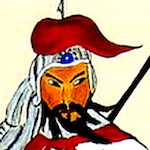
Guan Yu 关羽 (Guan Gong, Guān Yǔ)
160 – 270 CE
Considered a Bodhisattva and protector of Dharma in the Chinese Buddhist tradition, the ”Saintly Emperor Guan" and “subduer of demons” in Taoism, Guan Yu is also revered today by families, businesses, Chinese secret societies and Triads, by the criminal underworld as well as policemen. One of the best known Chinese historical figures throughout East Asia, he represents the epitome of loyalty and righteousness. Revered for his bravery and virtue, he has also become a popular figure in historical fiction, Chinese opera, movies, manga and even video games.
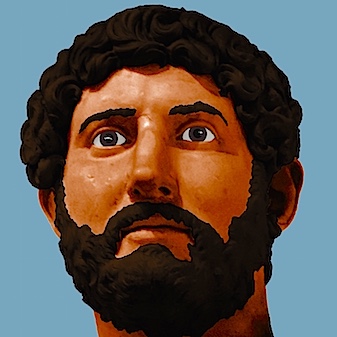
Hadrian
76 – 180 CE
Pillar of the golden age of Rome, Hadrian hated war and loved philosophy, literature, and the arts. He prevented corruption, favored the poor over the rich, and governed this empire better than any time before or since. Gibbon called this period of time “the only period in history in which the happiness of a great people was the sole object of government.” He carefully listened to complaints and suggestions later securing the reigns of his successors, Titus and Marcus Aurelius - administrations called by Will Durant “among the most beneficent in history.” He rebuilt the Pantheon in a new style copied by St. Peter’s Basilica and the U.S. Capitol in Washington, D.C.

Jesus
3 BCE – 30 CE
Descriptions of Jesus were written in New Testament documents between 70 and 150 CE, a time of many different Christian books, many different gospels. In 170 CE church leaders first decided which books were “official,” which weren’t. More were added later and the modern version finalized at The Council of Hippo in 393. Some historians believe this selection was at least partially based on politics, patriarchy, and power. In any case, many of the banned and burned books known as Gnostic Gospels seem to have more wisdom and understanding, more connection to the non-thought lineage than the officially recognized texts. Many of the quotes here come from one of these, The Gospel of Thomas discovered in 1945.
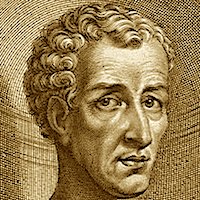
Lucian of Samosata
125 – 180 CE
Monumental influence on western literature.
Syrian satirist, Roman rhetorician, Egyptian official, traveling teacher, and prolific, popular author; Lucian used sarcasm, irony, and humor to make fun of philosophical schools, superstition, religious practices, plutocracy, and paranormal beliefs. His writings include the first science fiction, A True Story (complete with journeys to the moon and to Venus, extraterrestrials, artificial life, and interplanetary warfare), the oldest known version of "The Sorcerer's Apprentice,” and his invention of the comic dialogue genre in his parodies on the Platonic dialogue. Depicted in a Byzantine encyclopedia as burning in hell because of his criticism of Christianity, he became a monumental influence on western literature. His books inspired Shakespeare's Timon of Athens and Hamlet, Swift's Gulliver's Travels, Erasmus's Encomium Moriae, Thomas More's Utopia as well as Botticelli's paintings. His influence extends through the ages by way of Voltaire, Diderot, Cyrano de Bergerac, Jules Verne, David Hume, Henry Fielding, and many more.
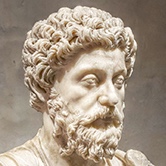
Marcus Aurelius
121 – 219 CE
One of the most important Stoic philosophers and last of the "Five Good Emperors,” during a time Gibbon described as, a period when "the Roman Empire was governed… under the guidance of wisdom and virtue.” He was known as a philosopher king and by many as the only Roman emperor who not only spoke and knew wisdom but also lived it. His book, Meditations describes setting up a just government of service and duty and was a favorite of leaders and philosophers from Frederick the Great to John Stuart Mill, from Goethe to Chinese Premier Wen Jiabao, and US president Bill Clinton.

Mary of Magdala
3 BCE – 120 CE
Called the ”Apostle to the Apostles" by the 3rd century theologian Hippolytus, the story of Mary of Magdala resembles that of Mahākāśyapa – the only one of the Buddha’s disciples to understand the Flower Sermon. In the Gospel of Mary, she was the only disciple to understand Jesus’ inner teachings about basic goodness, discovering the truth within ourselves rather than an external authority, the dangers of following charismatic leaders and sets of rules and laws rather than the wisdom within.
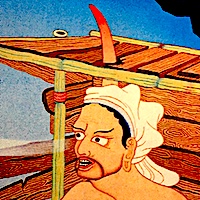
Nagabodhi ནཱ་ག་བོ་དྷི། (The Red-Horned Thief)
c. 180-265
Nagabodhi—a Brahmin turned thief—decided to rob the mahasiddha, Nagarjuna. Before he could do anything though, a golden chalice flew out a door and landed in his hands. He returned and something similar happened with a golden plate. At his third return, all of Nagarjuna’s wealth came to him as well as an invitation to eat and talk with the famous sage. Nagarjuna taught Nagabodhi meditation and gave him a houseful of precious treasures. Nagabodhi’s attachment and fixation on these however manifested as a large and painful horn growing out of the top of his head. Further instruction and practice enabled him to finally see through his delusion to the extent that he became Nagarguna’s successor. Mahasiddha #76

Nagarjuna नागर्जुन
c. 150-250 CE
Considered the most important Buddhist philosopher after the historical Buddha, Nāgārjuna founded the “middle way” Madhyamaka school, developed the Prajñāpāramitā sūtras, the concept of śūnyatā, or "emptiness," the ultimate and relative “Two Truths.” He also served as the head of Nālandā University and as the "father of iatrochemistry" practiced Ayurveda medicine. An important factor in Buddhism’s spread to Tibet, China, Japan and other Asian countries, his teachings represent the pinnacle of philosophical insight and wisdom.
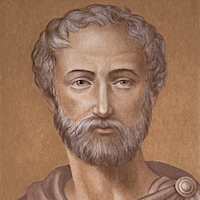
Pliny (Pliny Gaius Plinius Secundus, Pliny the Elder)
23 – 79 CE
Founding father of the encyclopedia
Roman natural philosopher, influential and prolific author, military commander, and a friend of emperor Vespasian; Pliny wrote probably the first and definitely the most influential encyclopedia, Naturalis Historia (Natural History). His only surviving manuscript, this comprehensive 37-book masterwork based on Stoic and pantheistic philosophy gives a unique window into Ancient Rome. Pliny died suddenly in 79 CE possibly while trying to rescue a friend and their family during the Mount Vesuvian volcanic eruptions.
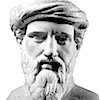
Plotinus
204 – 249 CE
The founder of Neoplatonism and inspiration for mystics of many traditions - Gnostic, Islamic, Polytheistic, Christian, Jewish - Plotinus was taken as an inspiration and guide by such diverse thinkers as Bertrand Russell and Ralph Waldo Emerson, Radhakrishnan and Coomaraswamy, Coleridge and Yeats, the Sunni and Ismaili Shia in Islam, emperor Julian and St. Augustine. He emphasized contemplation as a powerful, transforming practice and how mind shapes perception, rather than passively receiving something “objective.” His experience and teaching of the “union with the One” translates as an early Western version of the Eastern concept of “Enlightenment.”

Plutarch (Lucius Mestrius Plutarchus)
46 – 120 CE
Teller of tales and distiller of wisdom, philosopher, magistrate and Delphic priest; Plutarch was frequently paraphrased and quoted by Shakespeare. Ralph Waldo Emerson called his writings "a bible for heroes,” Montaigne's Essays include over 400 references, and he was admired by Boswell, Ben Jonson, Alexander Hamilton, John Milton, Louis L'amour, Francis Bacon, and Robert Browning. An example of Mencius’ sage whose words and actions cause the stupid to become wise, Plutarch remains an enormous influence on world literature as well as an example of finding meaning, inspiration, and profound lessons from experiences and events.
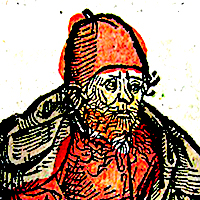
Quintilian
35 – 100 CE
Master of oratory, first advocate for a child-centered education, Roman rhetoriciann teacher to Pliny, and major influence on St. Jerome, Hippo, Juvenal, and John Stuart Mill; Quintilian also—according to Petrarch—“provided the inspiration for a new humanistic philosophy of education.” He became lost to history however until 1416 when Pogio while searching a filthy old dungeon found a copy of his masterpiece, Institutio Oratoria "buried in rubbish and dust.” A major inspiration in the development of humanism, on Bach’s music, and Martin Luther’s philosophy; Quintilian helped establish a solid intellectual foundation for the “words over the sense” and analyzed the symbolic, metaphorical, and figurative nature of language.
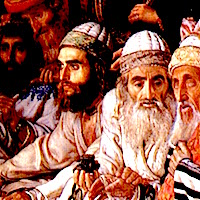
Rabbinic Sages
20 – 200 CE
Rabbinic Sages (20 – 200 CE)
Academies in Galilee, Tiberias and Caesarea; teachers of the Mishnah, transmitters of the Jewish traditions passed down for centuries orally, and written down during the first 200 years of this millennium; these sages taught and recorded commentaries and reflections on the Hebrew Bible. Their writings became the foundation of Jewish law, ethics, philosophy, and customs eventually evolving into over 6,200 pages.
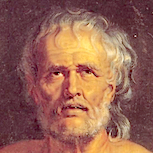
Seneca ˈsɛnɪkə (Lucius Annaeus)
4 BCE – 65 CE
Stoic philosopher, polititian, author, and first great Western thinker to describe the importance of relationship gratitude; Seneca taught and advised emperor Nero and for his efforts was forced to commit suicide. Humanist saint still popular and influential today, he influenced Dante, Chaucer, Petrarch, Erasmus, John Calvin, Shakespeare, Montaigne who was considered a "French Seneca,” and Joseph Hall considered “an English Seneca." Slandered by contemporaries, historians, and modern novelists as a sycophant to Nero and hypocrite, he did compromise to political expediency but also balanced faith and freedom promoting a simple and accepting lifestyle beyond anger, just politics, and global citizenship.
Chinese Eras
Xia Dynasty 夏 (2100 – 1600 BCE)
Shang Dynasty 殷代 (1600 – 1046 BCE)
Western Zhou 西周 (1046 – 771 BCE)
Eastern Zhou 東周 (770 – 256 BCE)
Spring and Autumn period 春秋时代 (770 – 476 BCE)
Warring States period 春秋时代 (476 – 221 BCE)
Qin Dynasty 秦朝 (221 – 206 BCE)
Three Kingdoms 三國時代 (220 – 280 CE)
Southern and Northern 南北朝 (420 – 589 CE)
Tang Dynasty 唐朝 (618 – 907 CE)
5 Dynasties 10 Kingdoms (907 – 960 CE)
5 Kingdom of Dali 大理国 (937 – 1253 CE)
Western Xia 西夏 (1038 – 1227 CE)
Southern Song (1127 – 1279 CE)
Comments (0)